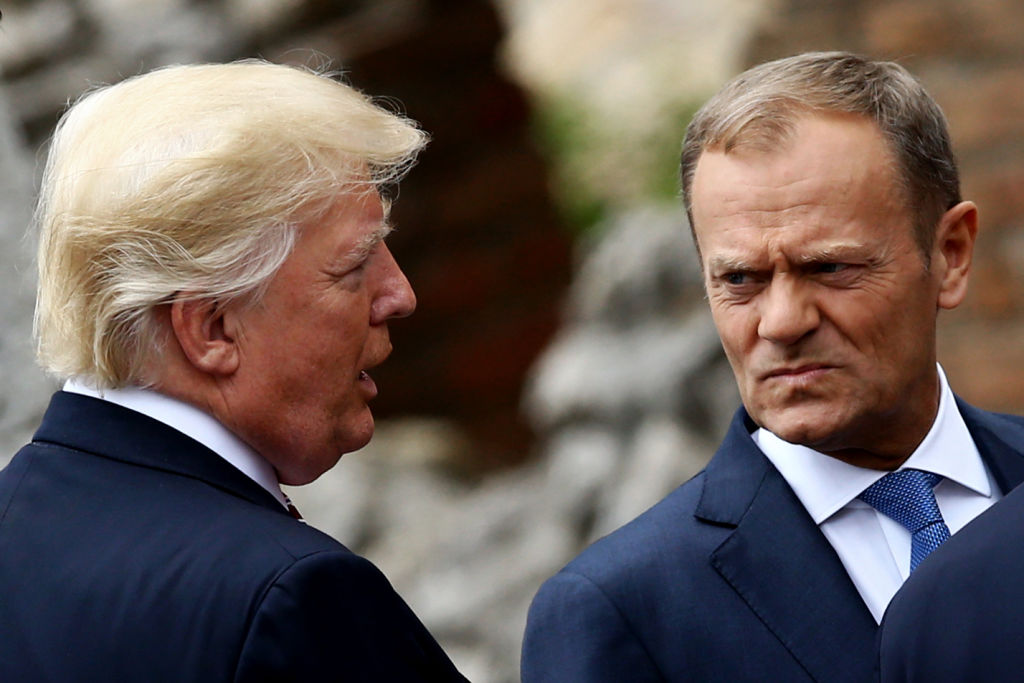Poland’s Presidential Runoff: Trump’s Influence and Implications
The Stakes of the Election
This Sunday marks a pivotal moment in Polish politics as the nation faces a closely contested presidential runoff election. With current Mayor of Warsaw, Rafał Trzaskowski, representing the Civic Platform coalition, and Karol Nawrocki, backed by the right-wing Law and Justice party (PiS), the race remains tight and fraught with implications for Poland’s future. Polls indicate that Trump’s endorsement of Nawrocki adds a compelling dimension to this electoral battle.
Trump’s Endorsement and Its Impact
Recent reports from the Associated Press detail how Donald Trump met with Nawrocki at the White House, reinforcing his support. Additionally, DHS Secretary Kristi Noem was dispatched to the Conservative Political Action Conference (CPAC) in Poland to further solidify this endorsement. During her appearance, Noem stated, “I just had the opportunity to meet with Karol and listen. He needs to be the next president of Poland. Do you understand me?” highlighting the belief that Nawrocki would lead with principles similar to Trump’s.
Context of the Election
As Andrew Michta, a Senior Fellow at the Atlantic Council, remarked to Fox News Digital, “This is arguably the most important Polish presidential election since the end of communism.” The backdrop of this election includes the ongoing war in Ukraine and the rising threat of Russian revisionism, creating a climate of uncertainty regarding Poland’s security.
Current Polling Data
In the initial voting round, Trzaskowski garnered 31.4% of the votes, while Nawrocki closely followed with 29.5%. This tight margin indicates that both candidates have strong support, and experts are apprehensive about predicting a clear winner. Stanisław Żaryn, an advisor to President Andrzej Duda, stated, “Nawrocki has a good chance of winning,” showcasing the competitive nature of this runoff.
Political Implications of the Outcome
The significance of this election extends beyond who occupies the presidential office. Although the role of the president in Poland is largely symbolic, the occupation comes with substantial powers, including the ability to veto legislation. This could result in significant barriers to governance if a president and prime minister from opposing parties emerge. Trzaskowski would have the potential to support Prime Minister Donald Tusk in pushing a more progressive agenda in Brussels, whereas a Nawrocki presidency could lead to political pandemonium if the two leaders fundamentally disagree on policy.
The Need for a Strong Polish Sovereignty
Matthew Tyrmand, a Polish-American dual citizen, highlighted the importance of this election for Poland’s sovereignty. He remarked, “We in Poland saw the unchecked PO government from 2010-15. If Tusk’s candidate Trzaskowski wins, Poland’s strong ties with the USA will weaken. This will also impact military and economic ties.” This sentiment underscores a broader concern that losing veto power could diminish Poland’s influence within the EU and erode its autonomy as Tusk leans toward further integration with European structures.
Judicial Independence and Veto Powers
During the administration of President Duda, the veto power became a tool against Tusk’s agenda, particularly concerning vital matters of judicial independence, which have been contentious with the EU. A victory for Trzaskowski could facilitate Tusk’s push toward reform, aligning Poland more closely with EU democratic and judicial standards.
Foreign Policy Directions
Both candidates present starkly different visions for the future of Poland’s foreign relations. Trzaskowski favors a more collaborative approach with Brussels and key European allies like Berlin and Paris. Conversely, Nawrocki’s ties with Trump and American Republican leaders suggest a potential strengthening of U.S. relations, which could lead to a more transatlantic-focused foreign policy. However, despite the differing approaches, analysts agree that Poland’s robust support for Ukraine is unlikely to shift, regardless of the election’s outcome.
The Refugee Crisis and Immigration Policies
Since the onset of the 2015 European refugee crisis, Poland’s immigration policies have hardened, particularly concerning candidates from the Middle East. Yet, in a striking contrast, Poland has welcomed over 1.5 million Ukrainian refugees since the onset of Russian aggression in February 2022. This duality reveals Poland’s complex stance toward immigration, grounded in both historical context and contemporary security considerations.
The European Union’s Perspective
Experts like Matt Qvortrup from the Centre for European Studies are cautious about a Nawrocki presidency, suggesting it may hinder the process of European integration. “A Nawrocki victory would be unwelcome among powerful EU countries, particularly Germany,” Qvortrup noted, emphasizing the implications for Poland’s role within the EU framework.
Conclusion: A Crossroads for Poland
As Poland prepares for this consequential runoff election, the stakes could not be higher. With endorsements from international figures like Trump, the political landscape is adapting in real-time, revealing deep-seated divisions within Polish society and its approach to the EU and U.S. relations. Regardless of the outcome, the election is poised to alter Poland’s trajectory significantly within both its domestic and international arenas.
